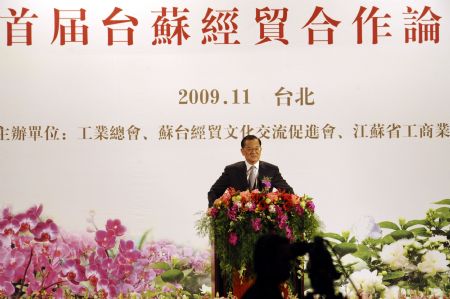Taiwan braces for visits by mainland delegation
A delegation from the Chinese mainland is expected to sign contracts with Taiwan's companies valued at more than three billion U.S. dollars during its 6-day trip on the island, the delegation head said Tuesday.
|
Kuomintang Honorary Chairman Lien Chan delivers a speech at the opening ceremony of "Jiangsu-Taiwan Week" held in Taipei, south China's Taiwan Province, Nov. 10, 2009. The "Jiangsu-Taiwan Week" kicked off in Taipei on Tuesday. |
The delegation, which arrived in Taipei Monday, was headed by Liang Baohua, chief of the Communist Party of China (CPC) provincial committee in east China's Jiangsu Province.
The delegation would also sign Memorandum of Understandings to enhance cooperation in areas including economy, trade, agriculture, science and technology, tourism, culture and education, said Liang at the opening ceremony of "Jiangsu-Taiwan Week" in Taipei Tuesday.
"Our visit itself reflects the peaceful development in cross-Strait ties in the past year," said Liang when he met the Kuomintang (KMT) honorary chairman Wu Poh-hsiung Monday.
Invited by the KMT central committee, Liang was the first CPC provincial committee chief to visit Taiwan. It indicated the expanding and deepening exchanges across the Taiwan Strait, said KMT Deputy Secretary-General Chang Jung-Kong.
Taiwan had received and would witness a series of mainland delegations headed by senior officials at the provincial-level.
A delegation headed by Li Chongxi, deputy chief of the CPC's Sichuan provincial committee arrived in Taipei on Nov. 1 to discuss cooperation in trade and tourism.
Beijing Vice Mayor Ji Lin, who led a group of more than 250 members, arrived at the island the next day and took part in a symposium on science and technology.
Xu Bodong, an expert on Taiwan affairs and also professor of the Beijing Union University, said the visit by the Jiangsu delegation was a continuity of trips made by Sichuan and Beijing.
"The trips reflect higher level development of cross-Strait ties as the exchanges at the local level involved more specific issues," he said.
The CPC and KMT reached an agreement on the common prospects for peaceful cross-Strait development in 2005, which had now become a basic policy of the Taiwan authority, said the Taiwan-based Straits Exchange Foundation (SEF) chairman Chiang Pin-kung when he met Liang Baohua Tuesday.
Local CPC chiefs on the mainland, however, had for a long time mainly played the role as hosts to receive KMT guests from Taiwan after the positive changes took place in the island in May 2008.
For example, Liang acted as a host to receive Lien Chan, Wu Poh-hsiung and Chiang Pin-kung for several times, according to Xu Bodong.
"Now they finally came to the front of exchanges and dialogue," Xu said.
As Liang Baohua put it, "Our visit is to implement the common prospects for peaceful cross-Straits development with pragmatic measures on behalf of a province."
Following Liang's visit, Xu Guangchun, chief of CPC's Henan provincial committee, will also visit Taiwan next month at the invitation of the KMT central committee, according to the Henan provincial committee Tuesday.
Wang Jianmin, a Taiwan affairs researcher at the Chinese Academy of Social Sciences, said "local CPC committees and government could make bigger stride in promoting economic, trade and cultural exchanges with a view to the new situation in cross-Strait relations."
Exchanges and cooperation at the local level across the Strait would be institutionalized in the future and would bring greater benefits to people on both sides, Wang said.
 0
0 








Comments